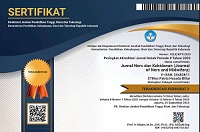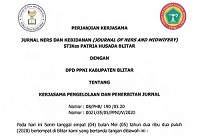Factors Influence Risk of Dementia in Elderly
DOI:
https://doi.org/10.26699/jnk.v7i3.ART.p389-397Keywords:
Elderly, factors, dementiaAbstract
The population of elderly globally is predicted continue to increase. The number of dementia cases in Indonesia reaches 1 million cases with an increase in the average life expectancy of Indonesians. WHO estimated that by 2050 cases of dementia will increase drastically, from currently around 36 million to more than 115 million. In 2011 the number of dementia cases in Indonesia showed 1 million people which will increase due to high average life expectancy continue to increase. This caused in the quality of life for the sufferer decrease which potentially became a big problem especially for developing countries that were not ready to handle large amounts of the need for treatment. Factors influence the risk of dementia were divided into 3 domain factors cardiovascular risk factors, lifestyle risk factors and other risks. The purpose of this research  analyzed factors that affect the risk of dementia among elderly in the elderly Posyandu, Tajinan Puskesmas work area Malang District. This research was cross sectional research methods. The sample Unit in this research was elderly who actively join elderly Posyandu in Tajinan Puskesmas, Malang District. Sample count 30 using proportionate stratified random sampling technique The Data analysis used SPSS software with logistics regression analysis tests. The results of this research showed that respondents who had high blood pressure had a chance of 23.9 times higher risk of cognitive problem compared to respondents who had normal blood pressure. This research also employed research articles, reports on research and teaching materials as the reference. The research recommends for elderly to maintain their health status especially blood pressure and emotions to prevent the occurrence of cognitive function/dementia.
References
A.Robles, B & Sampedro, G. (2018). New evidence of the relative protective effects of neurodegenerative diseases and cancer against each other. Neurologia.doi:10.1016/j.nrleng.2017.01.011
Bherer, L., Erickson, K., & Liu, T. (2013). A review of the effects of physical activity and exercise on cognitive and brain functions in older adults. Journal of Aging Research, 1-8. doi: 10.1155/2013/657508
Boyle, P. A., Buchman, A. S., Wilson, R. S., Leurgans, S. E., & Bennett, D. A. (2010b). Physical frailty is associated with incident mild cognitive impairment in community-based older persons. J Am Geriatr Soc,58(2), 248-255. doi: 10.1111/j.1532 – 5415.2009.02671.x
Clare, L., & Woods, B. (2004). Cognitive training and cognitive rehabilitation for people with early stage Alzheimer's disease: A review neuropsychological rehabilitation. Cochrane Database Syst Rev, 14(4), 385-401.
Kemenkes RI. Profil Kesehatan Indonesia Tahun 2014. Jakarta: Kemenkes RI: 2015
Price, S.A Wilson, L.M. (2013). Patofisiologi Konsep Klinis Proses-Proses Penyakit. Edisi VI Jakarta: EGC.
Toh, H. M., Ghazali, S. E., & Subramaniam, P. (2016). Review article the acceptability and usefulness of cognitive stimulation therapy for older adults with dementia : A narrative review. International journal of Alzheimer’s disease, 1-11. doi: 10.1155/2016/5131570
Downloads
Published
How to Cite
Issue
Section
License
Copyright (c) 2020 Jurnal Ners dan Kebidanan (Journal of Ners and Midwifery)

This work is licensed under a Creative Commons Attribution-ShareAlike 4.0 International License.






